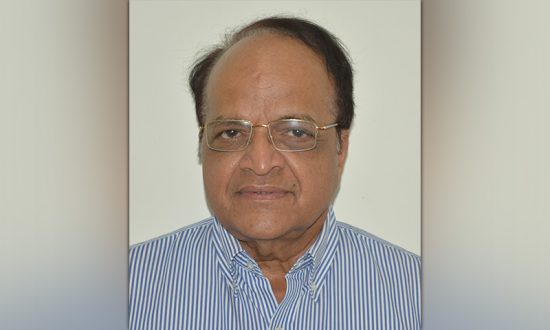Prof. V. N. Rajasekharan Pillai has been at the helm of affairs of many higher educational and scientific research establishments for 47 years of service as a teacher, researcher, professor, and executive head of Education, Science and Technology establishments globally. He is also working as President of a New Delhi NCR-based Civil Society Organisation, Human Development Foundation India, since 2015. He is on the Director Board of Apollo Group of Hospitals and on the Boards of several academic and research establishments in the country and abroad. Since January 2018, Prof. Rajasekharan Pillai is serving as the Professor and Provost of Somaiya Vidyavihar and Somaiya Ayurvihar under the Somaiya Trust, Mumbai.
Research is an integral part of education at all levels. It embraces all areas of human interventions. Premier universities across the world project research as their most distinctive and competitive strength. “World-Class” tag to Universities is predominantly through significant contributions in basic and applied research. The creation of new knowledge through research is a core activity along with higher levels of quality teaching is the hallmark of established universities and other higher education institutions. “Life without inquiry is not worth living for a human being” (Socrates, 469 – 399 BC). Globally accepted world ranking of systems of Universities like the Quacquarelli Symonds World University Rankings (QS-WUR), Times Higher Education (THE) Rankings, National Institutional Ranking Framework (NIRF) India, and university accreditation agencies, national and international, give significant weightage to research contributions and intellectual properties generated.
The advantages of research go beyond the acquisition of a quality doctoral degree. In fact, a doctoral degree is formal training for undertaking quality research. The research process generates critical thinking abilities and better analytical, and communication skills. Such attributes are very relevant and extremely useful. The Under-Graduate and Post-Graduate Teaching gets higher levels of recognition when research is integrated. The research contributes to the foundations of governmental policies around the world, which is important for economic and social development. Knowledge gained through research is the basis of sustainable development. This necessitates positioning research for the service of development and such knowledge needs to be converted into applications that are ultimately shared to ensure widespread benefits.
Creating a research ecosystem through effective collaboration among universities, research institutes, governments, industries, and the social sector is essential for societal developments at all levels. The creation of the National Research Fund as part of the 2020 National Education Policy of the Government of India is a major step forward in this direction. The policy also envisages more university-level teaching institutions to attain the research university status in the years to come.
The mandate was given to Private Universities in India clearly facilitates and encourages quality interventions in research. Indian Private Universities can really make inroads into research and knowledge creation at different dimensions like fundamental, basic, applied industrial, corporate, and translational research. In this context, the teaching and research community in the University should seriously ponder over the questions as to: how can we inculcate research culture in a university which is predominantly engaged in undergraduate first-degree level teaching? how research outputs can be enhanced primarily in quality, and then quantity? what are the ways to encourage research leading to social and economic benefits? and how the strategies, resources, and infrastructure can be aligned, enhanced, and optimized for maximum research?
Somaiya Vidyavihar University, other allied higher education institutions, and industrial establishments under the Somaiya Trust have been giving top priorities for basic and applied research. In agricultural research, biotechnology and in bio-refining we have state-of-the-art research and development laboratories and lab-to-land programmes. K J Somaiya Institute of Applied Agricultural Research (KIIAR), Research and Development wings of Godavari Bio-refineries, and Sathgen Biotech are establishments where our academic researchers can establish linkages and work together setting “in-house” examples of academia-Industry collaboration. The University has also research coordination institute, Somaiya Institute of Research and Consultancy (SIRAC), which is administering the research projects, taking care of seed- funding and organising orientation and research capacity-building programs for the benefit of all the constituent institutes.
The physical location of the University in Mumbai, which is the industrial and financial capital of the country, facilitates interaction with industries and corporates in a significant way. The fact that we are a comprehensive Multi-Faculty University, with Professional Disciplines as well as Humanities, Social Sciences, Languages, Fine Arts and Culture expands the scope of research. It is important that in addition to interfacing with industries our research scholars, research advisors, established researchers and teachers should network with the various academies and national research establishments in the country like the Indian National Science Academy, Indian Academy of Sciences, Indian National Academy of Engineering, Indian Council of Medical Research, Indian Council for Philosophical Research, Indian Council of Historical Research, National Academy of Letters, Indian Institute of Advanced Studies, National Academies of Management and Social Sciences. They need to be aware of the opportunities for young researchers in these premier establishments. ,There are also excellent opportunities for young researchers, women academics and scientists and PhD scholars in the mission mode research establishments in the country, the Indian Space Research Organisation and the Department of Atomic Energy. Such networking and participation in national and global research initiatives need to be strengthened for marking a space for ourselves in the global research community.




